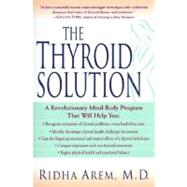
Note: Supplemental materials are not guaranteed with Rental or Used book purchases.
Purchase Benefits
What is included with this book?
| Introduction | 1 | (10) | |||
| PART I The Emerging Mind-Thyroid Connection: How a Tiny Endocrine Gland Intimately Affects Your Mood, Emotions, and Behavior | |||||
|
11 | (16) | |||
|
27 | (17) | |||
|
44 | (18) | |||
|
62 | (21) | |||
|
83 | (22) | |||
|
105 | (18) | |||
| PART II No, You Are Not Making It Up: Common Emotional and Physical Interactions | |||||
|
123 | (14) | |||
|
137 | (15) | |||
|
152 | (13) | |||
|
165 | (20) | |||
| PART III Women's Thyroid Problems: Your Symptoms Are Not All in Your Head | |||||
|
185 | (14) | |||
|
199 | (9) | |||
|
208 | (13) | |||
| PART IV Diagnosing and Treating Common Thyroid Disorders: The Journey to Wellness | |||||
|
221 | (20) | |||
|
241 | (22) | |||
|
263 | (19) | |||
|
282 | (13) | |||
|
295 | (21) | |||
|
316 | (13) | |||
|
329 | (18) | |||
|
347 | (5) | |||
| Notes | 352 | (20) | |||
| Resources | 372 | (6) | |||
| Bibliography | 378 | (4) | |||
| Index | 382 |
The New copy of this book will include any supplemental materials advertised. Please check the title of the book to determine if it should include any access cards, study guides, lab manuals, CDs, etc.
The Used, Rental and eBook copies of this book are not guaranteed to include any supplemental materials. Typically, only the book itself is included. This is true even if the title states it includes any access cards, study guides, lab manuals, CDs, etc.
Excerpted from The Thyroid Solution: A Mind-Body Program for Beating Depression and Regaining Your Emotional and Physical Health by Ridha Arem
All rights reserved by the original copyright owners. Excerpts are provided for display purposes only and may not be reproduced, reprinted or distributed without the written permission of the publisher.